Virginia’s 2009 NASCAR Rookie of the Year Award winner David Polenz won the title overcoming built-in challenges he accepted without a second thought.
Polenz, 18, of Pattenburg, N.J., can easily be categorized as a “how bad do you want it” type of young NASCAR Whelen All American Series stock car driver, but hardship is a concept he’s never considered.
Polenz and his Polenz Motorsports crew faced a one-way commute of four hours each Saturday because they wanted to race at Virginia’s Old Dominion Speedway, a .375-mile paved oval in Manassas. Polenz, like most young drivers, has a lot more desire to race than he does funding. So he pledges his income from working at Marty’s Auto Body to his family-owned race team. He supplements that income by working as a courtesy clerk at a local Shop Rite grocery story.
The outcome of his determined efforts brought positive results this year. Polenz won the 2009 NASCAR Whelen All-American Series Virginia state Rookie of the Year Award and finished second in the Late Model Stock Car division to track champion Willard Lawrence by just 19 points. Polenz also scored three regular-season feature wins, and then won “The Big One,” a 200-lap Old Dominion postseason event.
“We knew we wanted to race down south because that’s where the exposure is,” Polenz said.
But how did a New Jersey based team end up racing south of the Mason-Dixon Line?
He started his racing career at age six in Pee Wee go-karts. He passed through Quarter Midgets, then moved to Legends cars – which he first raced at Old Dominion Speedway in 2006. In 2007 and 2008, he competed full time at ODS in the Legends cars and won the division’s championship as well as the Legends state championship in 2008. Through these years, he was also racing at other tracks in New Jersey and New York in the Legends division.
With all that experience behind him, Polenz settled in as a Late Model Stock Car division rookie at Old Dominion Speedway in 2009. The decision to continue the team’s commitment to race at Old Dominion in a full-fledged stock car was an easy one.
“The management and staff at Old Dominion have always been very welcoming,” Polenz said. “They’re nice, enjoyable people. The Late Model Stock Car division is very competitive – especially the long-timers – and we can race there on our budget. Being able to run a crate engine or a sealed Late Model engine is helpful, and the cars use eight-inch wide tires. It all helps.”
Polenz Motorsports partnered with Moon Racing Enterprises of Stafford, Vir., for 2009. Dave Moon and company are located within an hour drive of ODS, which saves the Polenz team from hauling their race car from New Jersey to Virginia and back on a weekly basis. Moon is also the team’s car chief.
The nuances of Old Dominion’s race track are many, Polenz said. They make the track challenging for newcomers and veterans alike.
“The track has a lot of character,” Polenz said. “”The groove is on the inside in Turns 1 and 2, and on the outside in Turns 3 and 4. It changes so much between practice, qualifying and race time. You can have the car right for qualifying and when the track cools by race time the car won’t handle. That’s part of what makes restarts so tough. The track is as bumpy as they come. I challenge anyone who’s never been there to be successful the first time out. It’s just an odd track.”
While Polenz had plenty of experience driving Legends at ODS, he was a raw rookie in the heavier, more powerful full sized Late Model Stock Car in 2009.
“I had to learn the car and relearn the track,” Polenz said. “We struggled with our set-up, even when we got our first win. I never imagined we would win four times.
Polenz, who graduated from high school in spring of 2009, graduated from his rookie Late Model Stock Car season at Old Dominion by winning the postseason 200-lap event.
“Dad and I talked about that race for weeks,” Polenz said. “We had to make our tires work for 200 laps and have enough fuel for 200 laps. There were no pit stops and no tire changes. People tend to save their cars and tires in long distance races. Our plan was to try to get the lead as early as possible and then pace ourselves. Consistency comes to me pretty quickly.
“We started fifth, got the lead by lap 16 and led 184 laps to the finish. We hung out up front, and if we were challenged, we took off. Then we’d go back to pacing ourselves. People thought we were crazy going to the lead so early. Our plan was to make
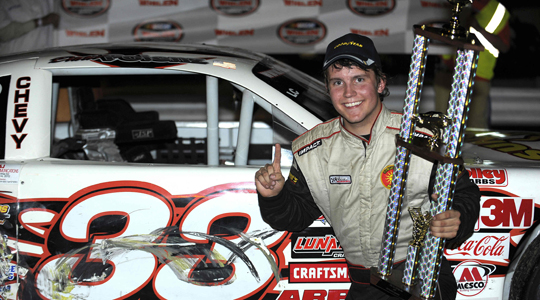
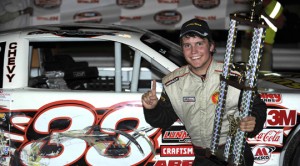
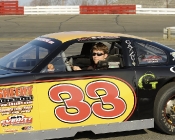
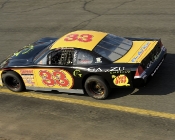
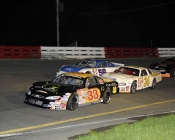
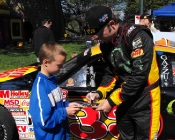
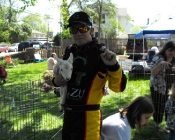
![225715_10150189406199361_130332029360_6494500_7839035_n[1] 225715_10150189406199361_130332029360_6494500_7839035_n[1]](http://www.davidpolenzracing.com/wp-content/gallery/51411-loch-lomond-elementry-school-bike-give-away/thumbs/thumbs_225715_10150189406199361_130332029360_6494500_7839035_n%5B1%5D.jpg)
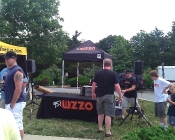
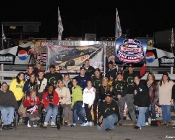



 Twitter
Twitter Facebook
Facebook Email
Email RSS
RSS
No responses yet